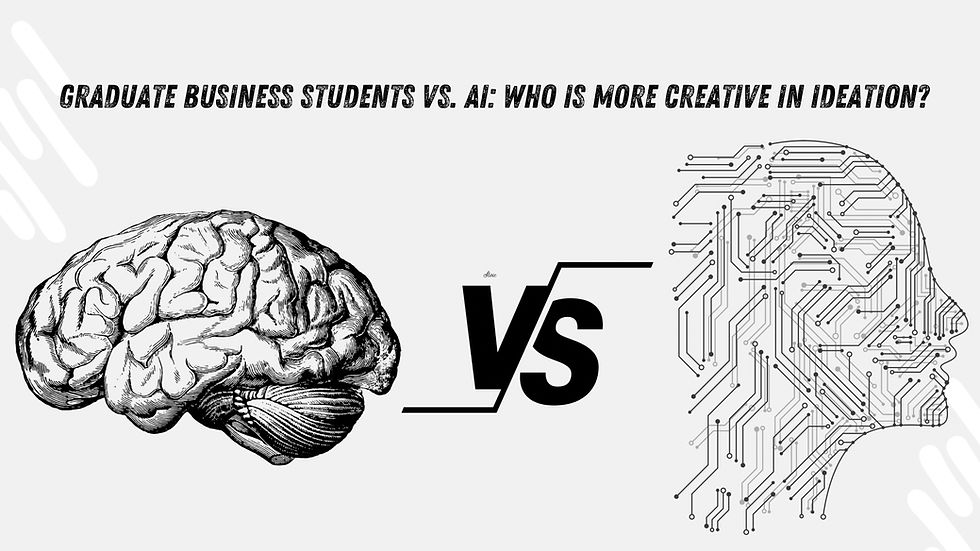Graduate Business Students vs. AI: Who is More Creative in Ideation?
- InrexEA

- Sep 25, 2023
- 2 min read

Is artificial intelligence proficient at birthing new, innovative ideas? Traditionally, AI has been considered lackluster in this department. Unstructured tasks like pinpointing new venture opportunities or devising solutions for untapped needs seemed beyond the reach of algorithms. But with the emergence of extensive language models like ChatGPT, this preconceived notion is under scrutiny.
In our extensive experience teaching innovation, entrepreneurship, and product design at Wharton School, we have witnessed thousands of new venture ideas presented by various individuals, from undergraduates to seasoned professionals. These ideas span the spectrum from extraordinary to terrible.
This extensive collection of ideas set the stage for an experimental contest, aiming to discern who reigns supreme in innovative thought: humans or machines. Alongside our colleagues Lennart Meincke and Karan Girotra, we organized a competition. Humanity was symbolized by a selection of 200 ideas from our students at Wharton, while ChatGPT4 represented the machines, tasked to formulate 100 ideas under the same conditions given to the students.
Further, we prompted ChatGPT for an additional 100 ideas post-exposure to several successful ideas from previous courses. This maneuver provided us with a grand total of 400 ideas to evaluate. Ideas flowed in abundance, from collapsible laundry hampers to ergonomic cushions for stiff classroom seats.
In our analysis, we employed the academic yardstick for creative performance, considering the volume, average quality, and the number of standout ideas. As anticipated, ChatGPT excelled in generating a higher number of ideas in a shorter time span compared to humans.
To gauge the quality, we subjected each idea to a customer survey, querying the likelihood of purchase based on the presented concept. The outcomes were translated into purchase probability using established market research methods. The findings revealed that ideas generated by ChatGPT had a higher average purchase probability compared to human-generated concepts.

Despite these numbers, in the realm of innovation, the quest is for extraordinary ideas, not just average ones. Our investigation of the top 10% of ideas underlined ChatGPT's dominance once again, contributing a significant majority of the most exceptional ideas.
The overwhelming victory of AI in generating extraordinary ideas alongside the significantly lower production costs revolutionizes our understanding of creativity and innovation. It introduces a fresh, invaluable source of ideas, augmenting and enhancing human creativity.
The early phases of the innovation process in organizations are now marked by a shift from generating ideas to critically evaluating them. Large language models enable the generation of an exhaustive array of ideas, necessitating an effective, efficient selection mechanism to pinpoint the gems amid the multitude.
Current models may not surpass an individual expert in forecasting commercial success, but collective evaluations from the target market continue to be a viable strategy. A collaborative human-AI framework, where AI serves as an assistant, promises comprehensive exploration of possible solutions, contributing to superior products and services, and addressing societal needs effectively in the future.



Comments